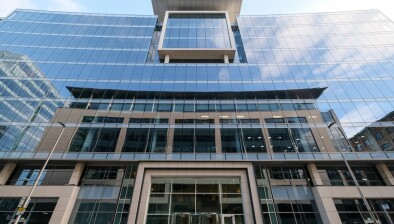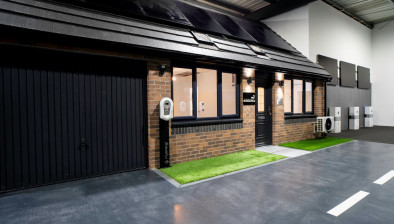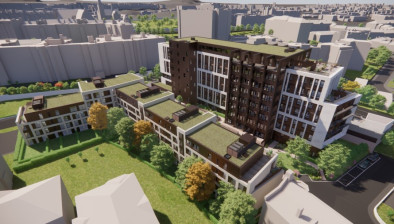New centre to consider how Edinburgh and Glasgow flats can aid net-zero targets

A new centre is to investigate how to make high-density buildings, like tenements in Edinburgh and Glasgow, more energy-efficient to reduce carbon emissions, lower heating bills, and bring more sustainable construction products to the market.
The new Centre for Net-Zero High Density Buildings, which has won a £4.5 million funding boost from the UK government through UK Research and Innovation (UKRI), will test its approaches in Scotland’s two largest cities because they have the UK’s highest proportion of flats.
Led by the University of Edinburgh, the research partnership combines the Universities of Glasgow, Strathclyde, West of Scotland, Edinburgh Napier University, and BE-ST – Scotland’s innovation centre for a net-zero built environment. The centre draws together £5.6 million investment from industry, education, the public sector, and the community.
Hosted by the University of Edinburgh’s newly opened Edinburgh Futures Institute, the Centre will test new prototypes and retrofit buildings with low-carbon materials, heating and cooling systems, and energy storage technologies.
The scheme will target buildings which typically house some of the UK’s most economically disadvantaged citizens, including many public sector and key workers. These groups tend to spend a higher proportion of their income on energy bills yet are more likely to experience health problems associated with cold and damp housing.
The Centre will operate six thematic working groups which will be managed and led by the universities involved, focusing on areas such as energy generation and storage, modelling and data analysis, EDI, skills and training, and offsite approaches.
The scheme’s recommendations will be shared with industry and government to inform how buildings across the country are retrofitted to achieve net-zero targets.
Caitriona Jordan, associate director of retrofit and energy efficiency at BE-ST, who will be leading on industry engagement, said: “Collaboration across industry is key to driving the transformation we need to meet our net-zero goals.
“BE-ST is proud to lead the industry engagement for the new Centre, working closely with partners to ensure that solutions for high-density buildings are effective, financially viable, and scalable.
“Drawing on our extensive pan-UK industry network, we will support the Centre to develop innovation projects which include leveraging our 70,000sqft Innovation Campus to manufacture prefabricated wall, floor, roof, and modular technologies co-designed with industry.”
Professor Sean Smith, director of the Centre for Future Infrastructure at Edinburgh Futures Institute, and the School of Engineering, who leads the new centre and research teams, said: “There is a critical net-zero challenge for our cities and towns, where densely packed buildings make a significant contribution to annual carbon emissions.
“The retrofit of buildings will become one of the largest activities in the global construction industry and this new centre will help the UK lead the way on new green economy solutions, enabling business growth and preparing for the skills and jobs ahead.”














